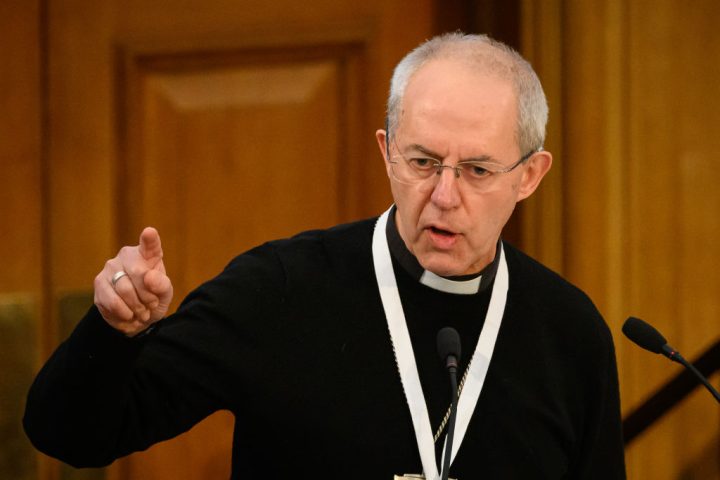Justin Welby has just visited Ukraine. While there he spoke clearly against the false religion that underlies Russia’s ideology, and called Patriarch Kirill, the Russian Orthodox leader, a heretic, a war-criminal and a perverter of the Christian gospel.
Alas, only the first sentence is true. Welby has never, as far I can see, called out his Russian counterpart. He doesn’t want to be undiplomatic, I suppose. True, Welby has condemned the invasion in clear terms; almost two years ago he was quick to call it ‘an act of great evil’. He then had a video call with Kirill (with Pope Francis also on the line) where he called the war ‘a great tragedy’ and said that ‘war and violence is never an answer’. Note the toning down from ‘great evil’ to ‘great tragedy’ when Kirill is present.
If a Christian leader has become an agent of fascism, this should not be politely glossed over
A year ago, on the war’s first anniversary, he seemed to think that Russia’s defeat was imminent, and warned leaders not to be too tough on Russia: ‘Russia cannot end up like Germany after 1919; it must be able to recover and be secure without being allowed to repeat its aggression.’
Last week Welby spoke to the Church Times at some length, and failed to mention Kirill’s name. At one point he referred to the tension between Ukraine’s two Orthodox churches, one of which is loyal to Moscow, and is therefore effectively banned. ‘I hope and pray for a reconciliation between these churches’, he said, as if they should be treated even-handedly. Asked about the religious ideology underlying the war he criticised Putin’s rhetoric of Russian world exceptionalism but again failed to mention Kirill or Russian Orthodoxy.
I know that it’s a big deal for one Christian leader to denounce another. It’s deeply ingrained in Christian leaders, especially Anglican ones, to prioritise the fostering of good relations. They often express pain at the divisions that afflict the global Christian community. But they are not diplomats in fancy clothes. They exist to proclaim the gospel. And if a Christian leader has become an agent of fascism, this should not be politely glossed over. Indeed the Russian Orthodox Church should be condemned, including British congregations that remain quietly loyal to Moscow.
I am imagining the pained look on Welby’s diplomatic face at this nasty talk of denouncing and condemning. But why should the secular face of Russia be condemned as ‘evil’ and the religious face treated leniently?
In fact Welby has a special role here, as the leader of a national Church that has moved beyond narrow nationalism and dangerous theocratic dreams. He should explain that the Church of England has renounced these options through its deep affirmation of political liberalism. But it is not entirely clear that he has sufficient understanding of his own tradition to do so. To be fair to him, most British theologians contribute to this failure, by spouting trendy ‘post-liberal’ theories, and neglecting liberal Christian principles. Perhaps it’s time for a theopolitical rethink.







Comments